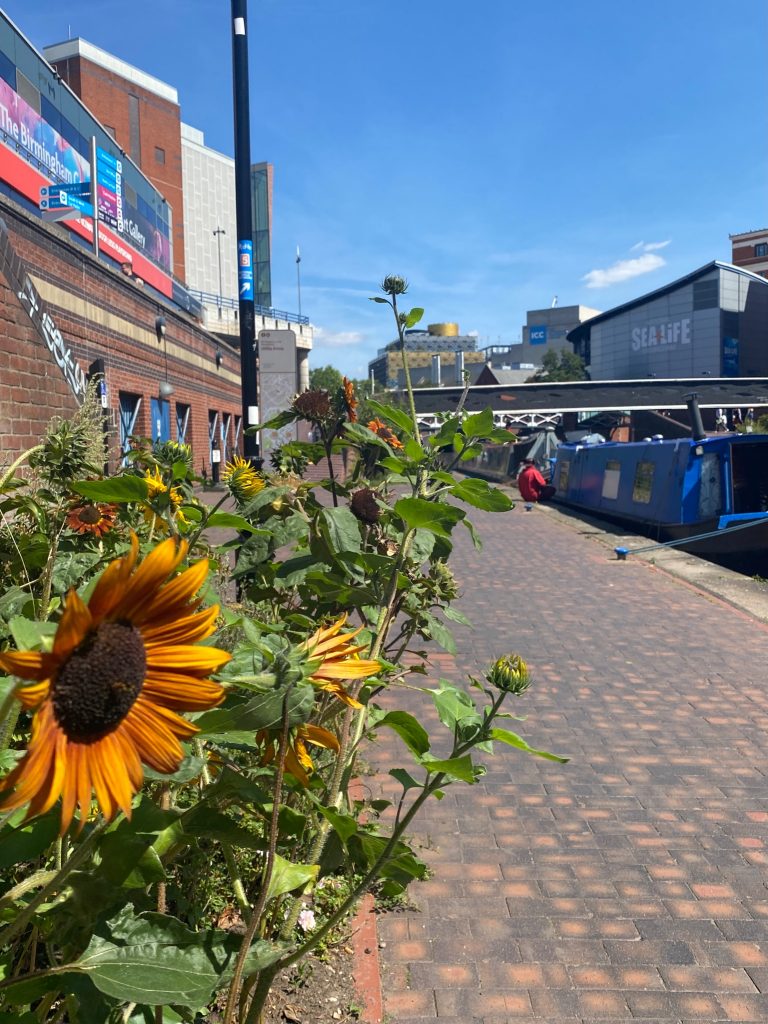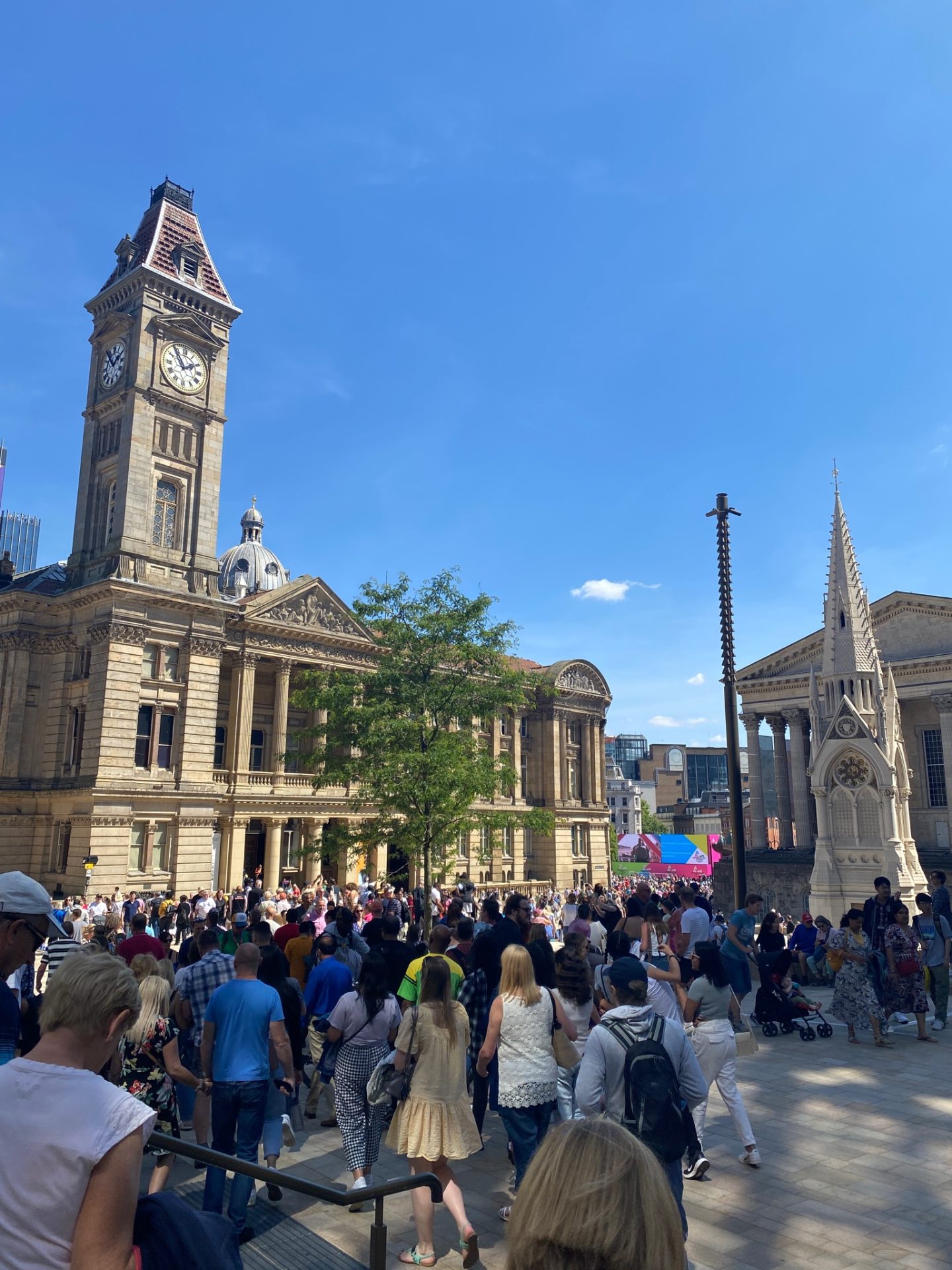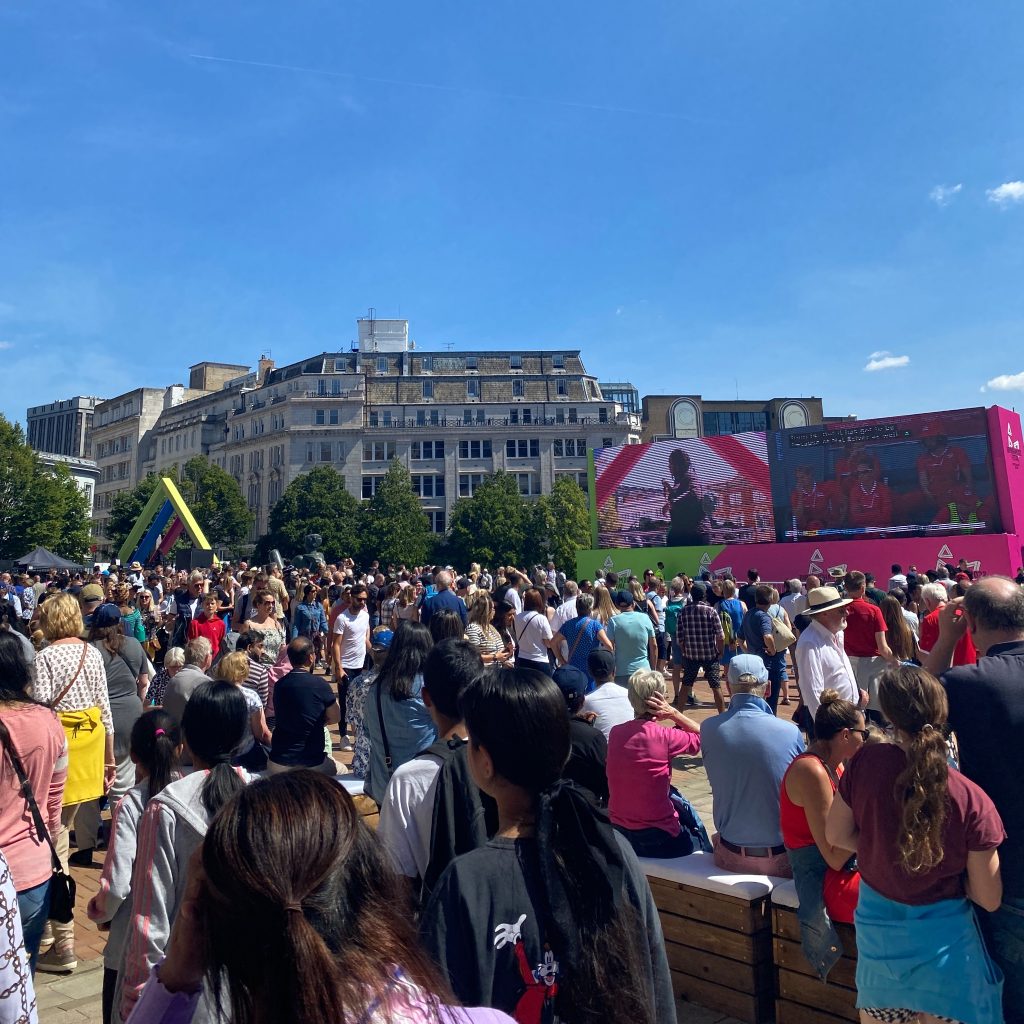When the Slow Ways slip quietly beyond the crowd, Saira remembers to stop off and soak in the bustle and cheer of summer cities
Camaraderie, pride, and joy; there is a lightness in the air. Birmingham in the summer, amid the Commonwealth Games, feels markedly different. The city centre has come alive. Its heaving streets and squares are flooded with colour, sports, music, culture, and life.
Following a short unplanned trip to see my dad, I’m taking the Slow Ways from Oldbury to Birmingham Moor Street station where I’ll get my train back to London, then onwards home to Brighton. Both Slow Ways have already been verified: Smethwick to Oldbury, and Smethwick to Birmingham. It’s the first time I’m using Slow Ways routing to get solely from A to B for a purpose.
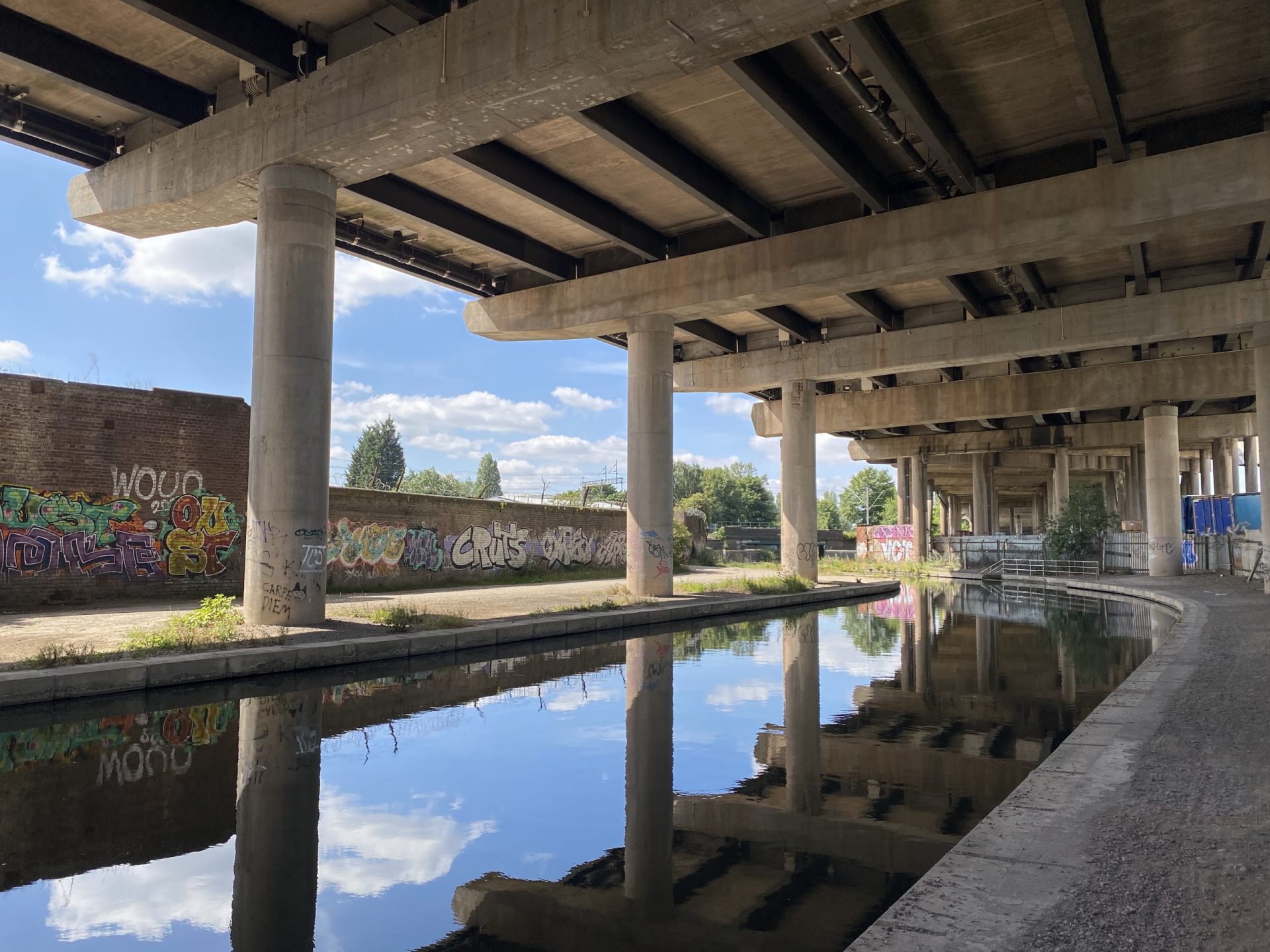
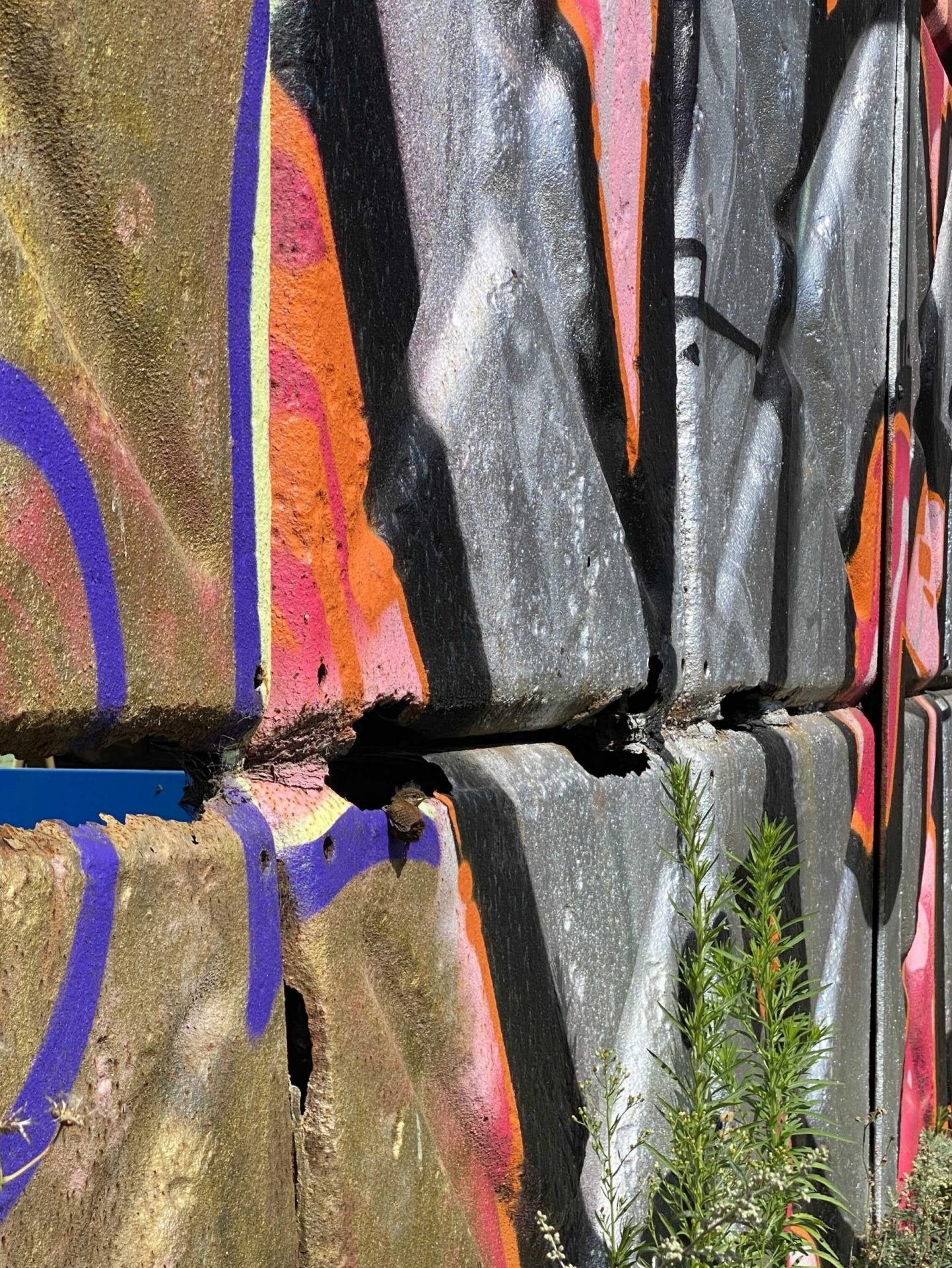
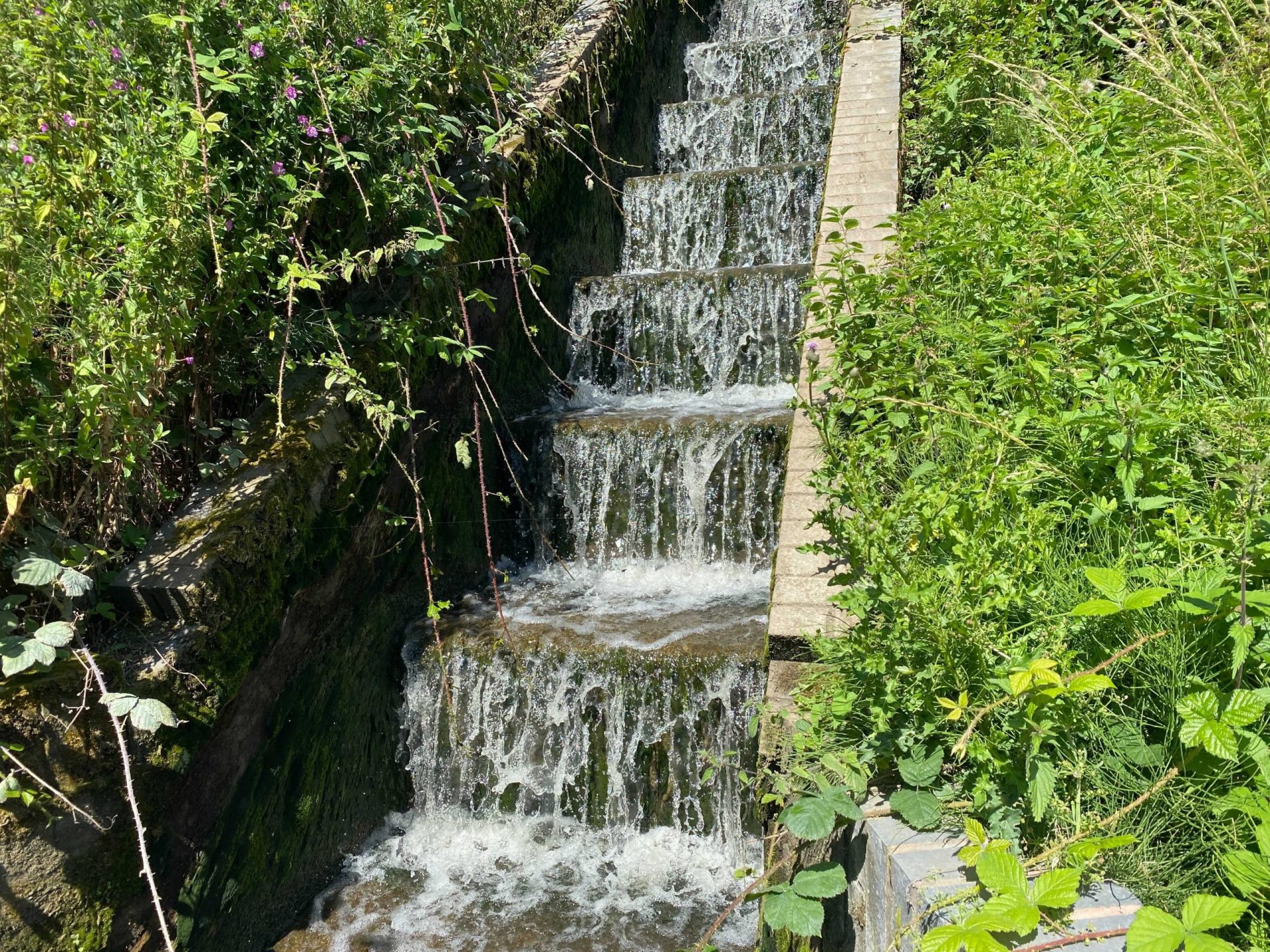
I’m avoiding the buses – from Oldbury they are busy, noisy, slow, and infrequent. I’ve spent a great deal of time on buses with my dad during my trip. He’s a big fan: “You can learn a lot about a place by taking a local bus. You can learn a lot about the people!” he always says. It’s true. Often Slow Ways walks (especially in remote areas) involve getting a bus, it’s part of the Slow Ways journey I’ve come to enjoy.
Glimpses into the lives of others
Buses offer glimpses into the lives of others. Dad and I have seen and heard all sorts of things on the bus. We’ve heard elderly people chat about the weather, about the rising cost of utility bills and food. We’ve heard teenagers arguing and babies crying. We’ve heard young preachers share the message of God. We’ve heard people speaking in different languages; Punjabi, Kurdish, Hindi, Polish, Swahili. Most people have a destination. Some don’t. Some just enjoy riding the bus.
Over the years, we’ve have explored so many different areas in the West Midlands by bus. We’ve got off and wandered around places like Cape Hill, Small Heath, Dudley, West Bromwich, Bearwood, Moseley, Kings Heath, and Smethwick. Every area is unique and characterful.
Buses remedy any feelings of self-importance
On one bus journey, I remembered something my friend Pat said – that he would prescribe himself South London buses. His band had recently been signed by a record label and invited to play at Glastonbury. He didn’t want his increasing popularity and fame to get to his head. Like my dad, Pat was very good at striking up conversations with other passengers and making friends in unlikely places. “I never want to become someone who can’t be anonymous on a bus,” Pat said. Bus journeys remedy any growing feelings of self-importance.
A bus gets you from A to B, sometimes directly, other times very indirectly – though the estates, the hospitals and around the houses. Buses are more unpredictable than other modes of transport, especially the 126 to Birmingham from Dudley via Oldbury. Sometimes it doesn’t come at all.
My dad is in his eighties and in recent years has become increasingly quiet and inward-looking. In his younger years, before he developed arthiritis, he loved walking. Nowadays he can’t walk for very long. So going on buses to different parts of town is a nice low-impact activity we can enjoy together. Another reason why dad loves buses is because it’s free for him to get on and off where he pleases. “I paid taxes all my life, I want to make the most of my Freedom Pass!” And my dad really does make the most of it. He’s explored so much of the UK via buses since he retired. In fact he often suggests areas I should go for walks based on his bus journey knowledge.
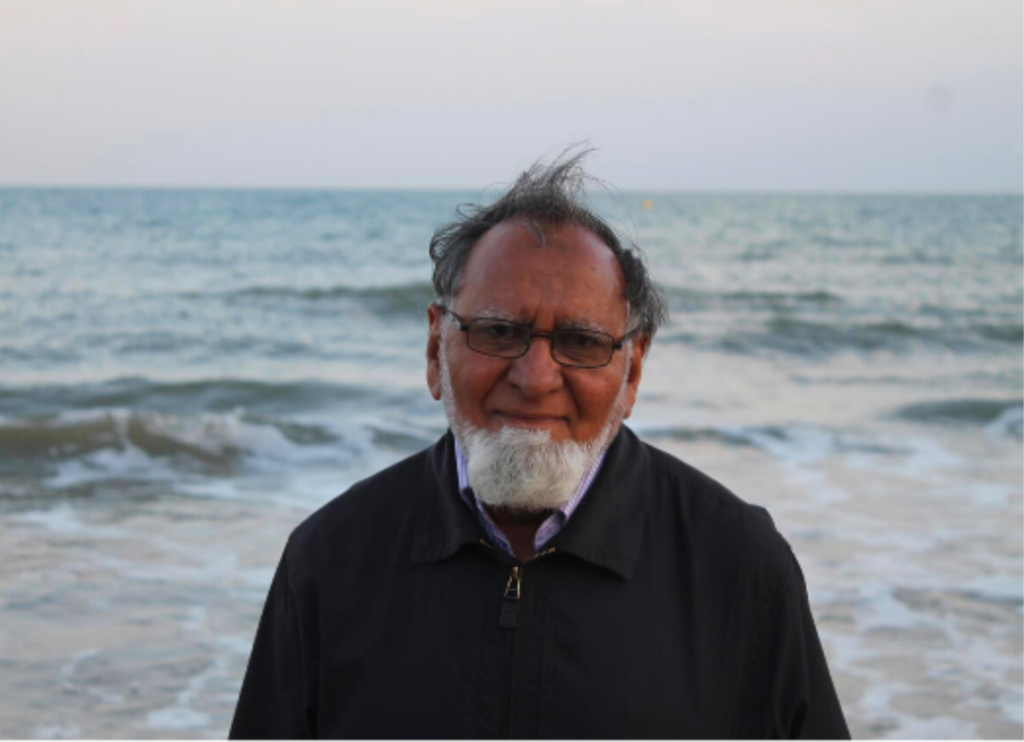
Off the bus
I’d walked both of these routes before I discovered Slow Ways. I decided that walking from where I was staying in Oldbury back to Birmingham would be a good way to decompress from the visit and ready myself for another long train journey. The route mostly follows the canals, it’s a varied sensory walk that skims along the edges of places.
Instead of plunging through colourful, frenetic, multicultural wonderlands, it takes you on the path less travelled: under motorways, beside industrial estates, through dark tunnels. This route feels edgy at times, and cut off, but it’s a route that I’ve really enjoyed on numerous occasions.
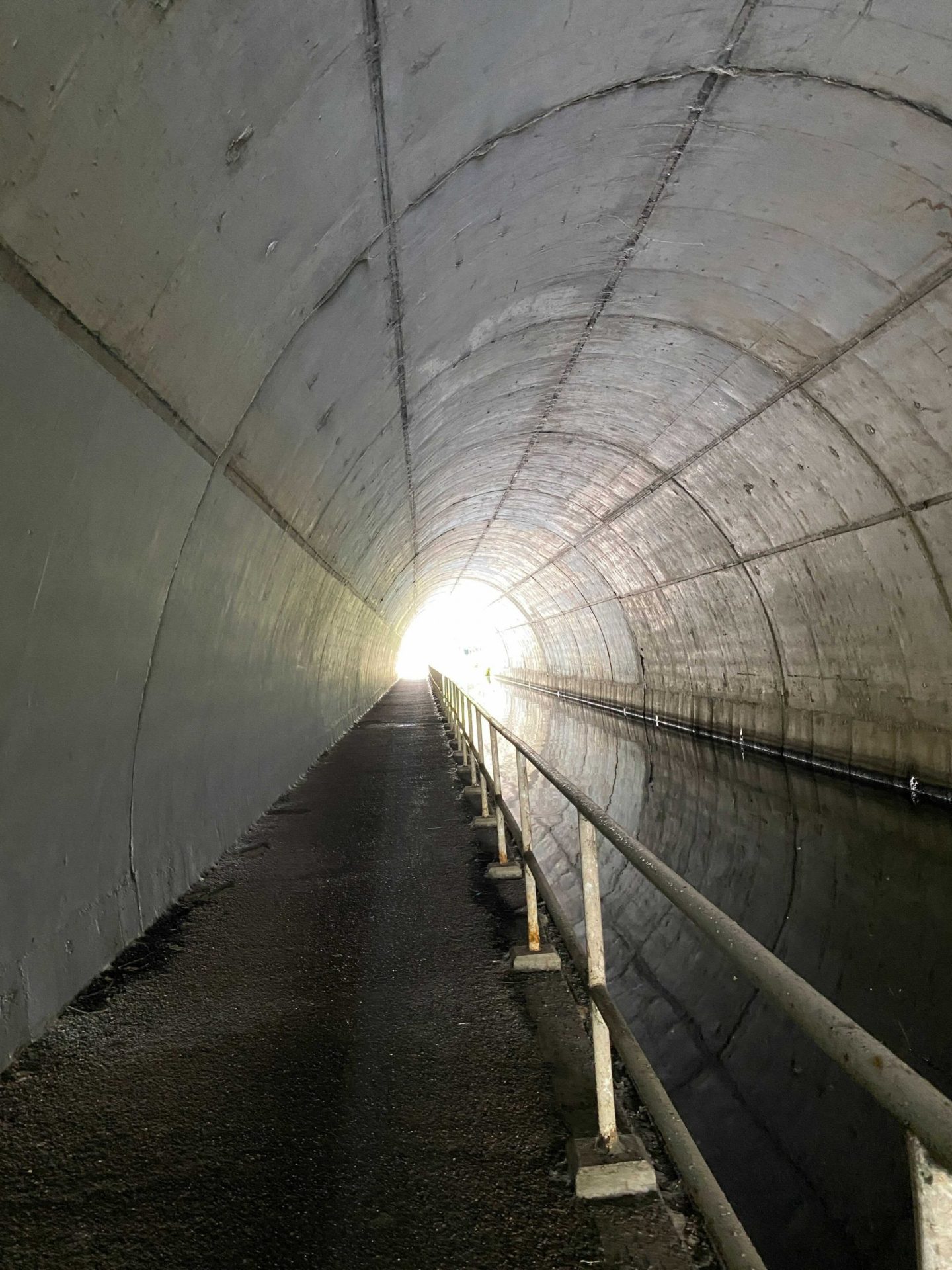
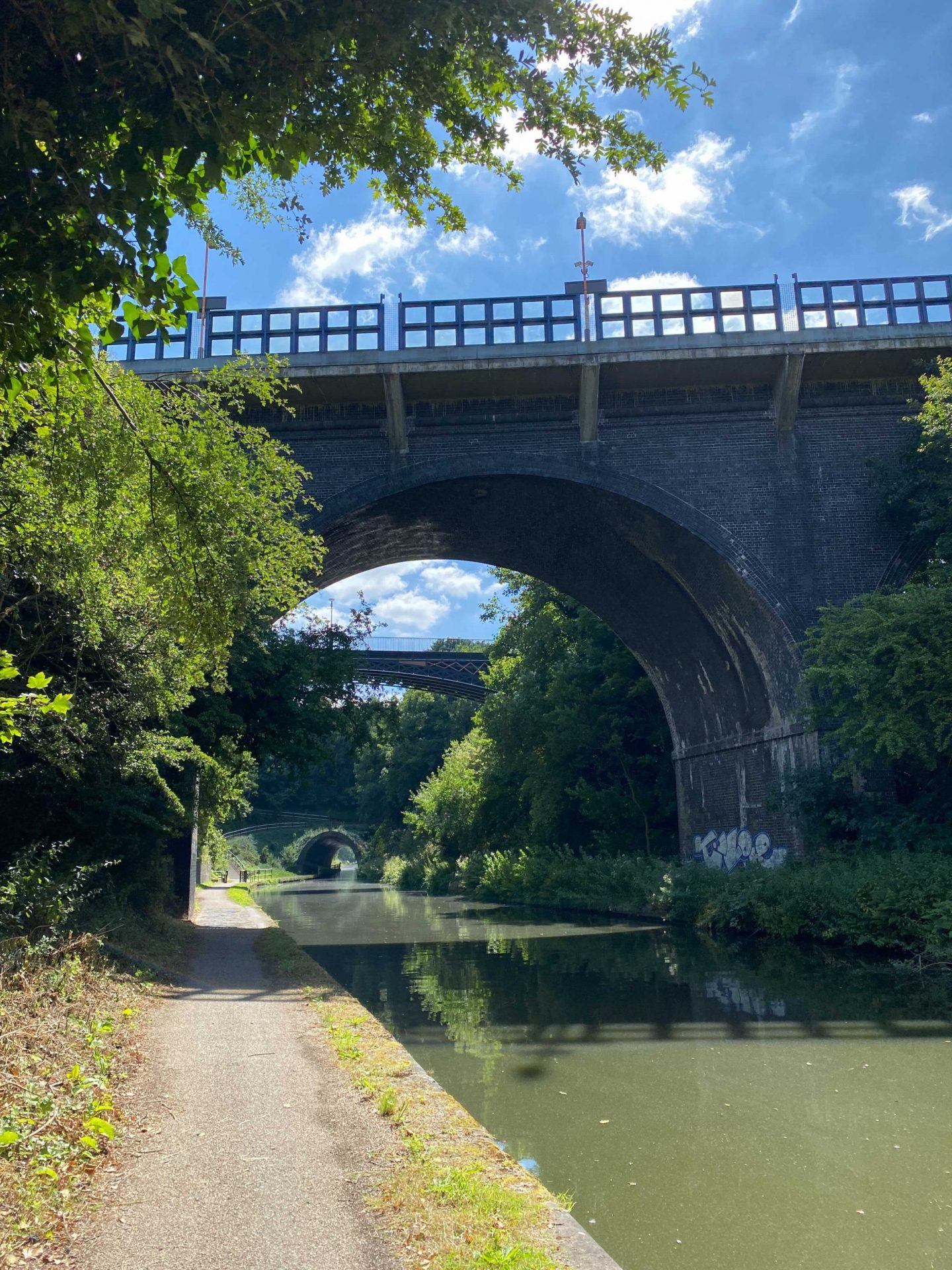
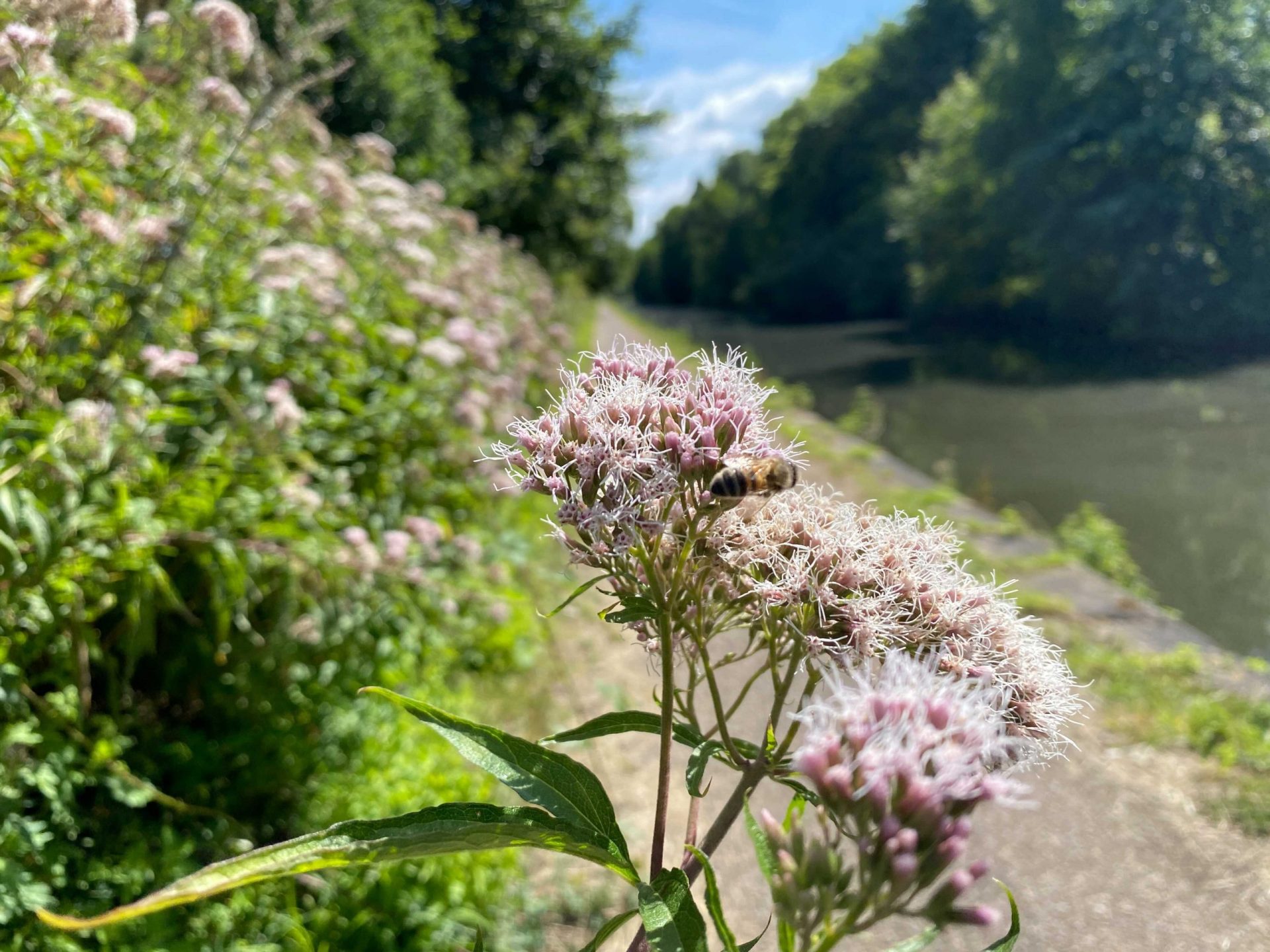
During the first few miles of my walk I don’t come across many people. I wander under the motorway, there are black swastikas spraypainted onto its pillars, and graffiti tags. I spot a baby swift clinging to the concrete ledge of a colourful wall. I hit a gate. The towpath is closed due to a crumbling wall. There are lots of derelict mills and factories along the route. I take a detour and re-join the canal at Spon Lane and walk up a pleasant stretch bordered by wildflowers, bees, and damselflies. I pass through Galton Tunnel, under Galton Bridge.
I was in Smethwick a few days ago with my dad. We explored Cape Hill together, a predominantly Asian suburb of Birmingham, and after a quick lunch we parted ways and my dad went to the mosque. Dad only likes to spend time together in short intervals. Still, the intervals have been beautiful.
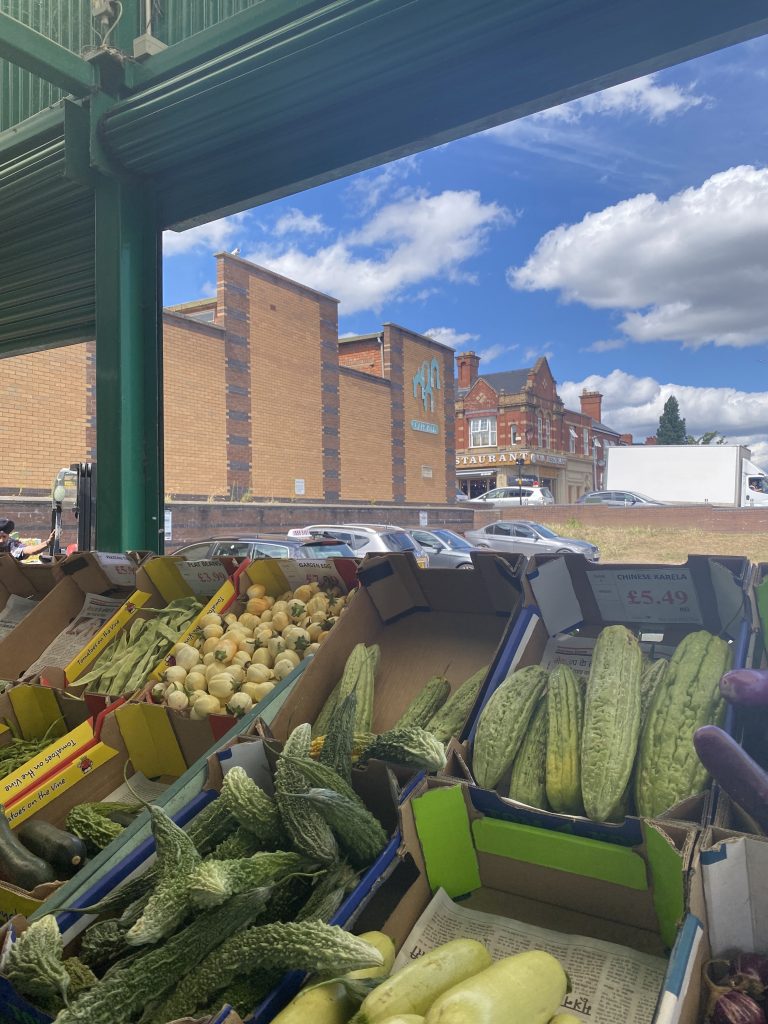
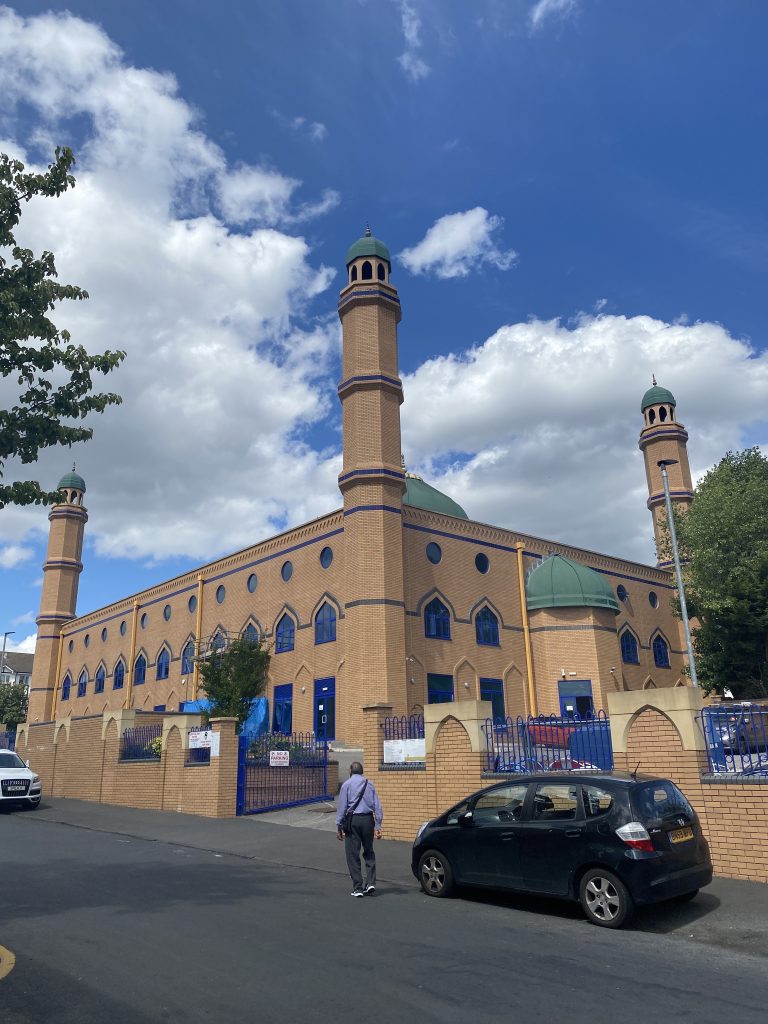
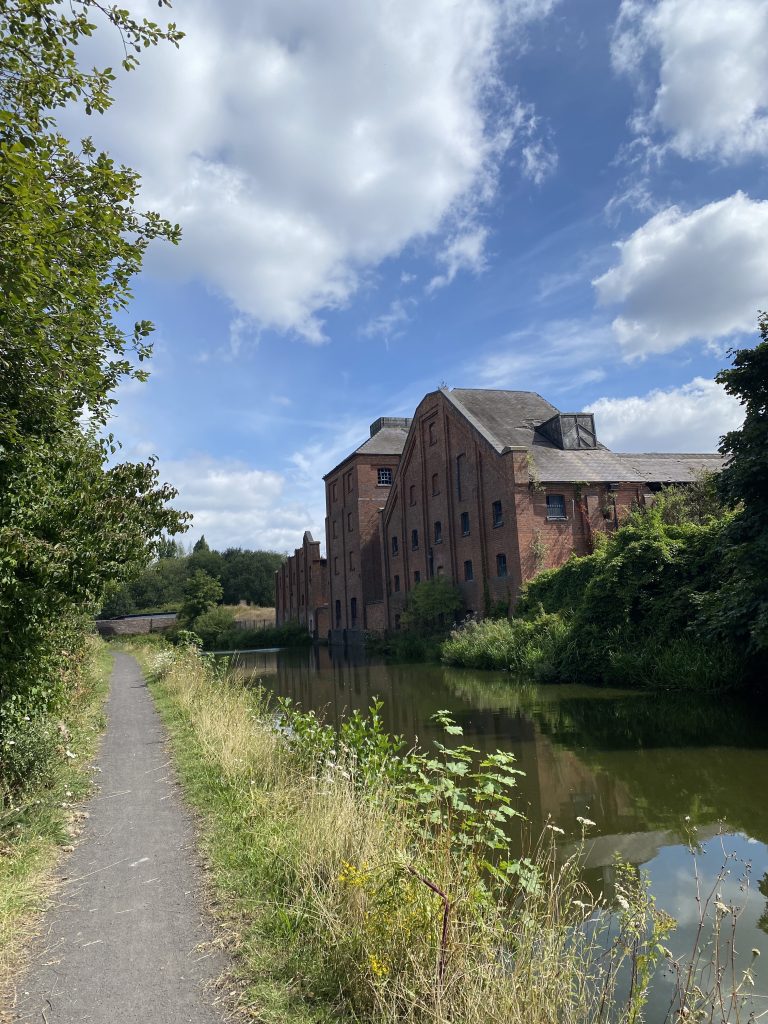
Beyond the towpath there is life
I always find the juxtaposition interesting. Here on the towpath I’m in an industrial edge-land but feel as through I’m somewhere rural and faraway. If I didn’t know the areas that lie beyond the towpath, I’d be surprised at their proximity. Slow Ways routes often veer away from busy roads and, by default, the people and places that make them interesting.
I think about all the places you miss along the way on this route, all the unexpected microworlds. In Smethwick: Punjabi Roots, an incredible music shop filled with sitar guitars, tablas and dhols (I remember speaking to the owner, a cool looking guy in shades. He asked me if I played an instrument, showed me vinyls, and told me about life in Smethwick), the Punjabi Archive, the Gurdwara, the Mosque, the Asian textile shops, the sweet shops, and supermarkets.
The men in turbans and kurtas, the women in colourful dupattas and salwar kameezes. You miss watching the elders who sit in the green and feed the pigeons, and the children who play on corners. You miss the loud snippets of conversation in Punjabi. You miss the busker singing a song that you heard in a recent dream. Or the opportunity to help an elderly woman with her heavy shopping bags.
Beyond the towpath there is life, thrumming along in the distance, the high street, the library, the leisure centre. In the folds of Oldbury, along the A-road. There is life. There’s a giant Asda, an Aldi, a McDonalds, a shiny new Tim Hortons where families and friends stop off for donuts and tea.
Places in between are everything
I thought of all the other places I’d visited just beyond the boundaries of the Slow Way: the coffin museum, the botanical gardens, the reservoir. For me, the places in between are everything. The beauty of Slow Ways is that although they often take in lesser-known and hardly-used routes, they connect these areas that are brimming. They connect places like Bearwood and Harborne and Kings Heath and Moseley. Along the way there are various entry and exit points where you can arrive, depart – and tarry.
The canal towpath becomes busier the closer I get to Birmingham centre. I’m happy to see people of all ages and backgrounds using the path – young couples, an elderly man on a mobility scooter, a mum and her kids.
Three hours on from the time I set out I finally arrive into the city centre, exhausted but joyful. After a few hours of quiet, it’s nice to get lost in crowds, to be surrounded in the busy colourful urban metropolis that is Birmingham, a city I’ve come to love. I pass familiar icons and new ones too, the newly installed raging bull outside the library, the art gallery and museum, Centenary Square. I arrive at Victoria Square where I break for a while. There is a celebration event taking place to mark the 60th anniversary of Jamaica’s independence. There’s music and dancing, joy, friendship, and a coming together. Summer in Birmingham – the city has come to life.
Slow Ways enable you to get from A to B. Most routes are direct and mostly off-road – but if you have the time, it’s worth going off the track and exploring the places and communities that make every town, city, and village in the UK special. Take a few buses and listen to a busker finish his set.
